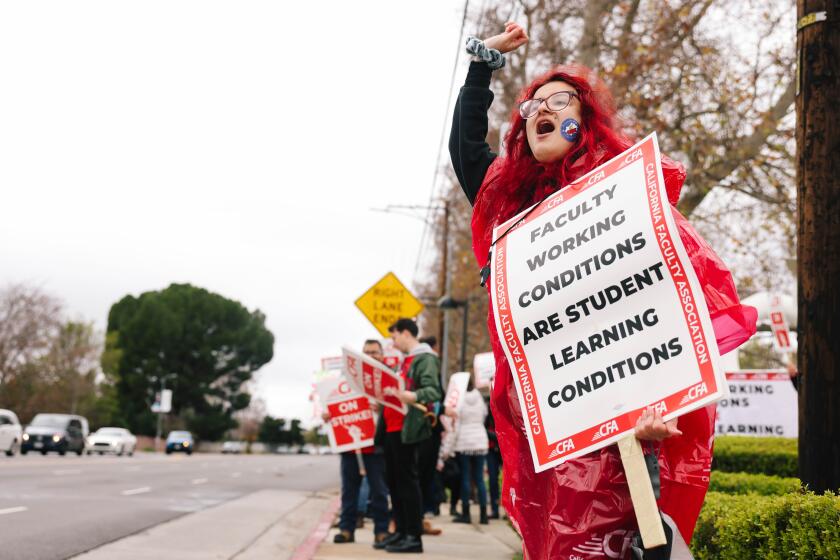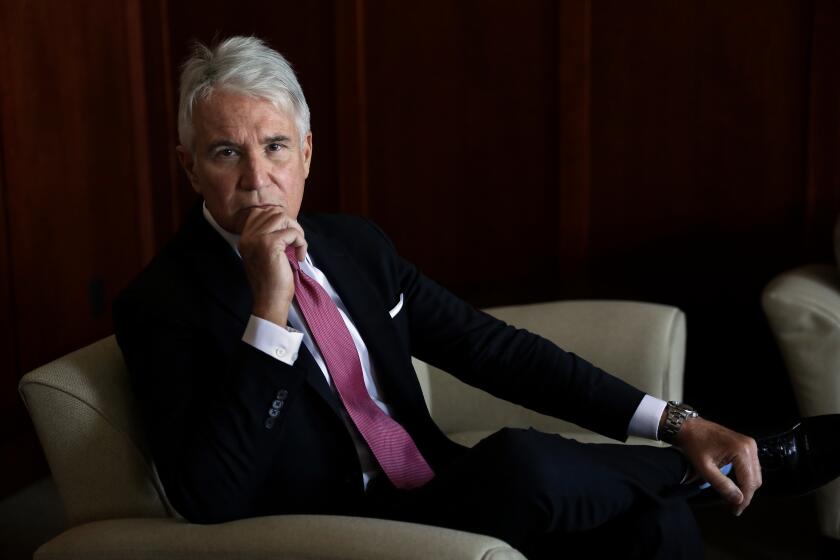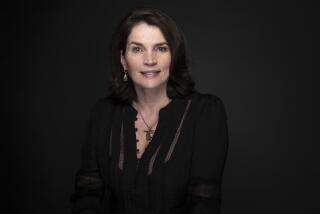Editorial: Providing criminal defense is not a crime. So why do some demonize lawyers for it?

- Share via
Shortly after Claudine Gay stepped down as president of Harvard University last month, an interesting sidelight to her years as a university administrator emerged: As dean of the faculty of arts and sciences a few years earlier, Gay was involved in removing a law professor from his secondary role as the dean of a campus dormitory.
The professor, Ronald S. Sullivan Jr., had caused an uproar on campus in 2019 when he joined the legal defense team of Hollywood producer Harvey Weinstein, who was accused of rape or sexual assault by more than 80 women and whose case launched the #MeToo movement. Weinstein was later convicted of rape on two coasts, as well as other crimes, and is serving a lengthy sentence.
For the record:
2:51 p.m. Feb. 13, 2024An earlier version of this editorial cited reporting that Joanna Weiss’ campaign said her husband had represented the Catholic diocese primarily on employment matters. Her campaign later said all of his work for the diocese was on employment matters.
As much as 70% of faculty at U.S. higher educational institutions are contract workers without benefits or job security. That’s not good for them, students or schools.
But at the time that Sullivan chose to defend him, Weinstein was legally an innocent man. He was as entitled to a robust defense as anyone else, as guaranteed by the Bill of Rights.
Harvard administrators backed Sullivan’s right as a lawyer to defend Weinstein but also saw his act as one that failed to take into account, as the dean of a house, the turmoil felt by the students in his dormitory. When Sullivan responded to students’ concerns by explaining the importance of a strong defense for unpopular defendants, Gay deemed it “insufficient” to address their feelings of being unsafe. Sullivan was pressured into stepping down as dean. Soon after, he also resigned from Weinstein’s defense.
This was hardly the first time that a lawyer has been vilified for representing people accused of heinous crimes. One hundred years ago, iconic lawyer Clarence Darrow, who already had a reputation for taking on controversial cases, was widely criticized for defending two teenage thrill killers.
You would think that by now college students and the public would understand that no matter how heinous the alleged crime, our country’s legal system holds people innocent until proven guilty and aims to treat the accused fairly and without favor.
Does it always work out that way? No. Wealthy people can afford entire teams of brilliant lawyers. Black men have historically received stiffer sentences than white men for the same crimes, according to a study by the U.S. Sentencing Commission. But either way, everyone is entitled to a defense, whether in criminal or civil court. That almost always means they need a lawyer.
L.A. Dist. Atty. George Gascón is making the criminal justice reforms voters elected him to carry out. Ignore the law enforcement establishment’s resistance and keep him on the job.
The same issue came up this month involving the contentious race for the 47th Congressional District in Orange County, which has included mudslinging on both sides. The campaign of Dave Min launched a political ad that accuses another Democratic candidate, Joanna Weiss, of funding her campaign with the money her husband earned representing the Catholic Church in sexual molestation cases. (The Times endorsed Min in this race as the better candidate.)
Weiss’ campaign, which has its own ad attacking Min, said her husband’s work for the church was on employment issues.
But that’s not the issue. The church had a right to legal defense on sexual abuse as well as any other matter, and lawyers (and their families) should not be demonized for providing it. Lawyers simply serve a function in the legal system, just as a judge does. Min, a former law professor at UC Irvine, certainly knows this.
At times, even prosecutors feel the public lash for doing their work. Christopher Darden, who is running for Los Angeles County Superior Court judge, was vilified by some people in the Black community for prosecuting O.J. Simpson.
Ultimately, better public understanding begins with better communication. And in this, Harvard missed an opportunity to educate by example by standing up for a basic principle.
The public needs to be able to discern the difference between people and organizations that behave outrageously, and the rights of those people and organizations to be represented in courts of law. This includes the right of lawyers to take unpopular cases and their responsibility to give their clients the strongest possible defense.
This does not make students or the public unsafe. What would make everyone less safe is a justice system that runs on popular opinion rather than on the intentions laid out in the Bill of Rights.
More to Read
A cure for the common opinion
Get thought-provoking perspectives with our weekly newsletter.
You may occasionally receive promotional content from the Los Angeles Times.












